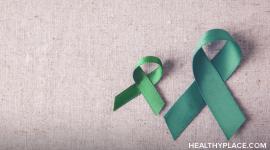Trichotillomania and Excoriation: Distress Turned on the Body
Here's what's happening on the HealthyPlace site this week:
- Trichotillomania and Excoriation: Distress Turned on the Body
- From the HealthyPlace Mental Health Blogs
- Video: Bipolar Hypomania: What It's Really Like
- Most Popular HealthyPlace Articles Shared by Facebook Fans
- Mental Health Quote
-----------------------------------------------------------------
Facebook Live This Wednesday
Join us for our Facebook Live tonight. We’re talking about “Nighttime Anxiety: Ways to Get Some Sleep When Anxiety Keeps You Awake”. And therapist, Emily Roberts, will be taking your personal questions on any mental health subject.
We start at 8p ET / 7 CT. We hope to see you there and feel free to invite anyone you wish.
https://www.facebook.com/HealthyPlace/.
------------------------------------------------------------------

Trichotillomania and Excoriation: Distress Turned on the Body
Have you heard phrases like “I’m so stressed I’m tearing my hair out” or similar sentiments? What about images of people looking upset and grasping their hair? Often, such comments and depictions are facetious representations of stress. However, in rare cases, people literally pull out their hair.
Trichotillomania disorder and excoriation disorders are two illnesses in which people use their body to alleviate emotions such as anxiety, stress, tension, a need for control, or sometimes even boredom. Trichotillomania is the compulsive pulling out of one’s hair (especially scalp, eyebrows, and eyelashes), while excoriation is compulsive skin picking (particularly face, arms, and hands).
These disorders share characteristics:
- They’re classified as obsessive-compulsive and related disorders (they involve compulsions—repetitive behaviors—but not obsessions)
- The behavior is repetitive, done either sporadically throughout the day or done in bursts that can last hours at a time
- Hair pulling or skin picking can be ritualistic—there is a specific method, time, setting, etc. for the behavior
- Alternately, some people aren’t even fully aware that they’re doing it
- People try to stop but are unable to do so without help
Experts disagree on whether these disorders should be considered an act of self-harm. Self-harm or not, trichotillomania and excoriation are distressing. Professional help is often needed, but people can overcome them.
Related Articles Dealing Trichotillomania and Excoriation
- What Causes Trichotillomania, Compulsive Hair Pulling?
- Trichotillomania Treatment: How To Stop Pulling Out Hair
- Hair Pulling in Children: Trichotillomania
- Effects of Compulsive Skin Picking, Chronic Skin Picking
- How to Stop Skin Picking: Treatment for Skin Picking
Your Thoughts
Today's Question: If you’ve ever engaged in hair pulling or skin picking, what have you done to manage it? We invite you to participate by sharing your thoughts, experience, and knowledge on the HealthyPlace Facebook page and on the HealthyPlace Google+ page.
From the HealthyPlace Mental Health Blogs
On all our blogs, your comments and observations are welcomed.
- Why We Hide Our Diagnosis of Bipolar Disorder
- Reduce Anxiety and Panic by Building Basic Skills
- Advocate for Mental Health Care Improvements for Your Child
- Self-Care for Mental Health: How to Care for Yourself in Ways that Work
- I Think My Friend Has Borderline Personality Disorder
- When Love Isn't Enough in a Relationship with Mental Illness
- Distraction from Depression Can be a Healthy Coping Skill
- Strategies for Self-Regulation in Children with DMDD
- Random Acts of Kindness Boost Your Self-Esteem
- Not Trusting Myself Because of Schizoaffective Disorder
- What Is Invisible Self-Harm?
- My Personal Experience with Mental Illness Stigma
- What I Know About Eating Disorders Now But Wish I Knew Then
Feel free to share your thoughts and comments at the bottom of any blog post. And visit the mental health blogs homepage for the latest posts.
------------------------------------------------------------------
From HealthyPlace YouTube Channel
I'm Hannah. I Have Bipolar 2
Bipolar Hypomania: What It's Really Like
A major part of living with bipolar 2 disorder is experiencing hypomanic episodes. (Individuals who live with bipolar 1 disorder experience manic episodes.) Bipolar hypomania is described as an elevated mood, hyperactivity, distractibility, and feelings that cause you to be restless and irritated at times.(Watch Hannah)
------------------------------------------------------------------
Most Popular HealthyPlace Articles Shared by Facebook Fans
Here are the top 3 mental health articles HealthyPlace Facebook fans are recommending you read:
- Tips on Dating Someone with a Mental Illness
- What Are Your Reasons to Recover from Self-Harm?
- Moving Past Shame After Abuse in PTSD Recovery
If you're not already, I hope you'll join us/like us on Facebook too. There are a lot of wonderful, supportive people there.
------------------------------------------------------------------
Mental Health Quote
"Saying "I'm tired" when you're actually sad."
Read more depression quote.
------------------------------------------------------------------
That's it for now. If you know of anyone who can benefit from this newsletter or the HealthyPlace.com site, I hope you'll pass this onto them. You can also share the newsletter on any social network (like facebook, stumbleupon, or google+) you belong to by clicking the links below. For updates throughout the week, circle HealthyPlace on Google+, follow HealthyPlace on Twitter or become a fan of HealthyPlace on Facebook. Also, check out HealthyPlace on Pinterest and share your mental health pins on our Share Your Mental Health Experiences board.
APA Reference
Peterson, T.
(2018, May 21). Trichotillomania and Excoriation: Distress Turned on the Body, HealthyPlace. Retrieved
on 2025, April 19 from https://www.healthyplace.com/other-info/mental-health-newsletter/trichotillomania-and-excoriation-distress-turned-on-the-body


